Online Databases
Columbia and Barnard students and faculty have access to several enormous databases which provide access to a vast quantity of personal papers, memoirs and letters; organizational records; rare books; complete runs of many important homophile, LGBTQ, and feminist newspapers and magazines; visual materials including photographs, videos, and posters; and much more, assembled from archives across the world. These are invaluable resources and deserve your attention.
To access materials in these databases, follow the links provided and log in with your Columbia/Barnard ID and password. Some, though not all, of the publications and other materials will appear in CLIO searches; many, though not all, of the materials are full text searchable. Most are divided into collections, reflecting either their original analog archival source or a particular thematic area. Once you’ve logged in to a database, start by browsing the collections and reading their descriptions to get a sense of the types of materials included. Look to see what types of searching are possible within them, whether by full text keywords or subjects, time periods, types of materials, or other variables. The databases vary widely in content, and they are not always systematic or comprehensive in their collecting; some content overlaps between databases; and much of it complements holdings in other databases. While it may take some time to orient yourself, your searching will be rewarded by providing you with materials that go well beyond what you can access in the physical collections at Columbia or New York City.
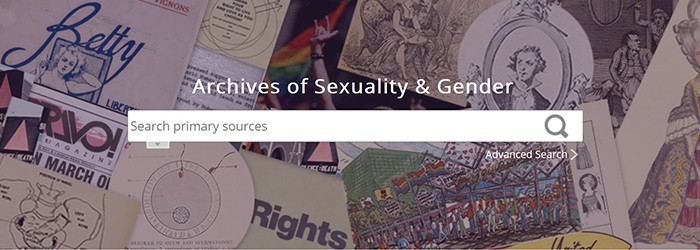
Archives of Sexuality and Gender: LGBTQ History and Culture Since 1940
The Archives of Human Sexuality and Identity: LGBTQ History and Culture Since 1940 (Gale) database provides a vast store of searchable primary sources describing LGBTQ life, politics, activism, and culture in the twentieth century from the United States, United Kingdom, and beyond. Holdings include assorted issues (usually not complete runs) from gay, lesbian, trans, and feminist publications in the United States, including Drum, FTM Newsletter, The Homosexual Citizen, Goodbye to All That, Common Woman, and many more, as well as from over 35 countries, including Der Kreis (Switzerland), Fuori! (Italy), Lambda (Spain), OutRage (Australia), The Body Politic (Canada), and hundreds of others. Other important sources include the internal records of political and social organizations such as ACT-UP, Daughters of Bilitis, Mattachine Society of New York, Atlanta Lesbian Feminist Alliance, and the Gay Activist Alliance. The collection also features interviews and correspondence from prominent LGBTQ figures, FBI files from federal surveillance of LGBTQ people and groups, and other sources drawn from the Lesbian Herstory Archives, the GLBT Historical Society, the New York Public Library, the National Institutes of Health, and the London School of Economics. The database includes 51 collections on particular themes (such as AIDS, transgender identity, and feminism), from the personal collections of specific activists (such as homophile organizer Don Lucas and gay historian Allan Bérubé), and from specific repositories (such as the National Transgender Library and Archive and the Canadian Lesbian and Gay Archives).

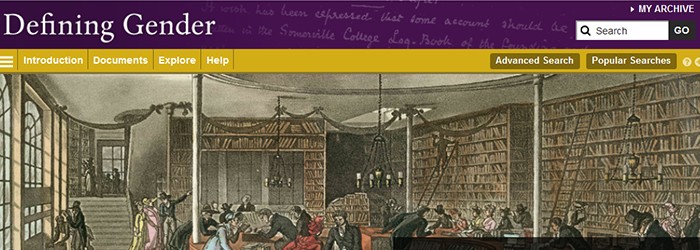
Defining Gender, 1450-1910
Defining Gender, 1450-1910 (Adam Matthew) offers primary sources concerning gender, leisure and consumer culture in British history across five centuries. Documents are divided into and searchable through five areas of topical focus—conduct and politeness, domesticity and the family, consumption and leisure, education and sensibility, and the body—as well as by document type, the archive from which they were obtained, and hundreds of common keyword phrases. A series of eighteen essays on themes and periods by leading scholars helps to contextualize the sources and suggest avenues for research; they are supplemented by biographies of key subjects or contributors and an interactive chronology positioning the sources across time. Key sources include works by early gay writers Edward Carpenter and John Addington Symonds; legislation and court proceedings relating to prostitution, venereal disease, and public sex; medical and sexological tracts; advice literature around sex, marriage, and hygiene; and erotically charged memoirs, broadsheets, and pamphlets.

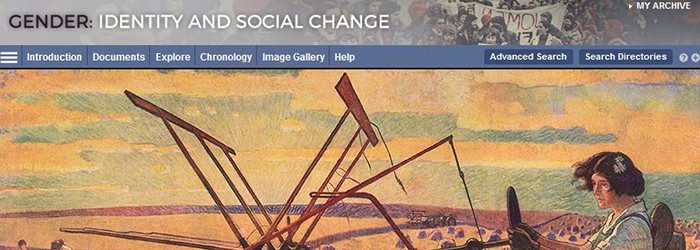
Gender: Identity and Social Change
Gender: Identity and Social Change (Adam Matthew) provides “primary sources documenting the changing representations and lived experiences of gender roles and relations from the nineteenth century to the present,” from the United States, Canada, the United Kingdom, and Australia. Key topics include women's suffrage, feminist, and men’s movements; education, labor, and employment; sex, sexuality, and the body; domesticity and the family; organizations and societies; and legislation, government, and politics. Materials pertaining to sexuality include documents from conferences on men and masculinity, diaries, sexual histories, LGBTQ-themed posters and writings, and documents relating to sexual assault and violence against women. Other features include contextual essays drawing on the source material (including “Gay Male Identity in the 1970s” by James Rosenheim), video interviews on gender and history with members of the project’s editorial board, an interactive chronology, and a gallery highlighting visual sources including photos, drawings, posters, and other objects from the collection.

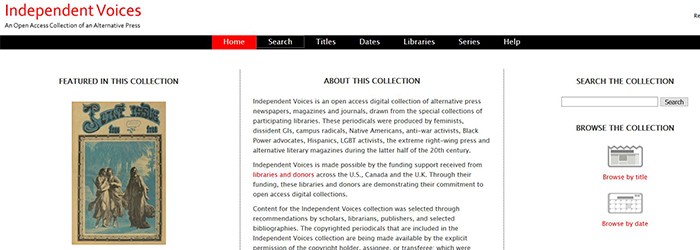
Independent Voices
Independent Voices (Reveal Digital) is an open access, full text searchable digital collection of hundreds of alternative press newspapers, magazines and journals produced by “feminists, dissident GIs, campus radicals, Native Americans, anti-war activists, Black Power advocates, Hispanics, LGBT activists, the extreme right-wing press and alternative literary magazines during the latter half of the 20th century” in the United States. In addition to counterculture and social movement classics such as New Left Notes, The Berkeley Barb, and Dandelion and feminist titles such as It Ain’t Me, Babe and Off Our Backs, the collection also includes a variety of important LGBTQ-themed periodicals, including homophile era journals ONE Magazine and Tangents, gay liberation papers such as Come Out! and Gay Liberator, and lesbian publications such as Lavender Woman, Sinister Wisdom, Lesbian Connection, The Furies, and Lesbian Tide.

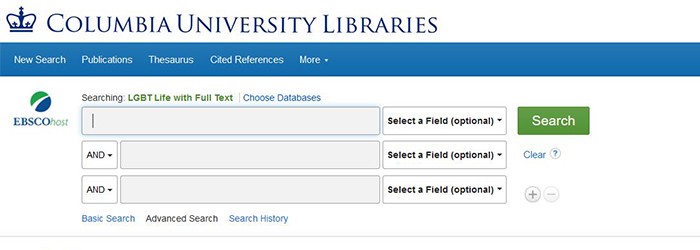
LGBT Life with Full Text
LGBT Life with Full Text (EBSCO) “provides indexing and abstracts of worldwide literature on gay, lesbian, bisexual and transgender issues, as well as full text for more than 50 journals, magazines and regional newspapers and dozens of monographs.” Many critical early gay and lesbian publications appear—The Advocate, ONE, The Ladder, Mattachine Review, Christopher Street, Body Politic, The New York Native, and many others—indexed with searchable keywords and descriptions; PDF or HTML full text versions of individual articles are available for some. The database also includes some monographs and reference books, newsletters, speeches, and a thesaurus of LGBT-related terminology including over 6,400 entries.

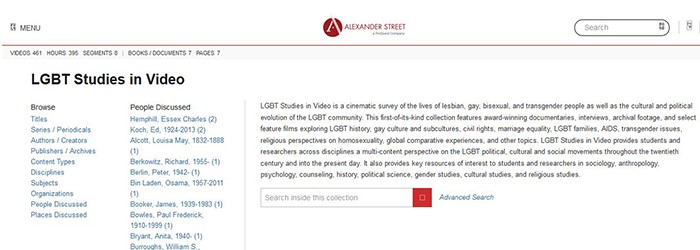
LGBT Studies in Video
The LGBT Studies in Video (Alexander Street) database offers “a cinematic survey of the lives of lesbian, gay, bisexual, and transgender people as well as the cultural and political evolution of the LGBT community.” The collection includes over 500 streamable videos with text-searchable transcripts, including “documentaries, interviews, archival footage, and select feature films exploring LGBT history, gay culture and subcultures, civil rights, marriage equality, LGBT families, AIDS, transgender issues, religious perspectives on homosexuality, global comparative experiences, and other topics.” Important examples include early erotic films and documentary footage from Pat Rocco, WGBH’s American Experience interviews with participants and historians about the Stonewall Uprising; documentary portraits of activists such as Vito Russo, Audre Lorde, and Bayard Rustin; and a variety of experimental short features exploring aspects of gender, sexuality, and identity.

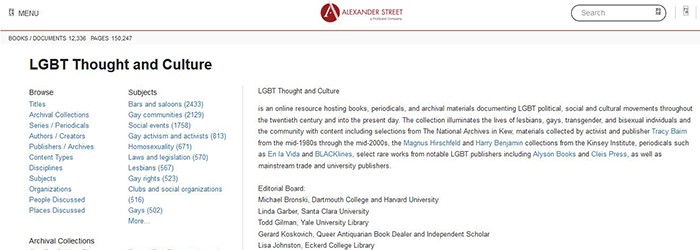
LGBT Thought and Culture
LGBT Thought and Culture (Alexander Street) hosts over 12,000 books, periodicals, and other documents offering insight into the lives, organizations, movements, and cultures of lesbian, gay, bisexual, and transgender people in the twentieth-century United States, United Kingdom, Canada, and Australia. Twenty-five archival collections comprise the heart of the collection, providing papers from sources such as sexologists Magnus Hirschfield and Alfred Kinsey, UK Home Office records, transsexuality researchers John Money and Harry Benjamin, gay travel maven Bob Damron, activists Hal Call, Morris Kight, and Jeanne Cordova, and novelist Radclyffe Hall. An additional 68 periodical series offer issues of activist newspapers Fag Rag, Gay Community News, and The Body Politic, Black and Latinx LGBT publications such as BLACKlines and En La Vida, and lesser-known sexological and medical journals. Other holdings include a sampling of fiction and nonfiction books from LGBT presses Alyson Books, Akashic Books, and Cleis Press, as well as some university presses. Not all items are full text searchable, but are rendered easier to find through a system of careful indexing in searchable categories of titles and authors; publisher or archive sources; subjects and disciplines; people, places, or organizations referenced; and types of materials.

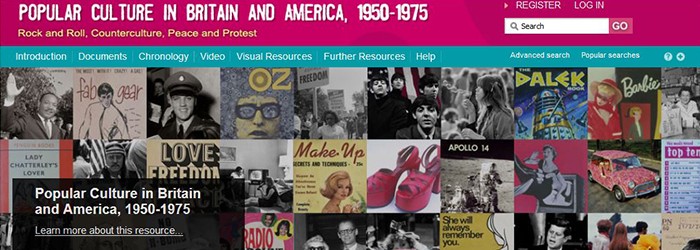
Popular Culture in Britain and America, 1950-1975: Rock and Roll, Counterculture, Peace and Protest
Popular Culture in Britain and America, 1950-1975 (Adam Matthew) collects print and manuscript sources, visual material, video clips, and other materials from a critical trans-Atlantic period of social, cultural, and political change. Drawing on a diverse range of archives from the Bancroft Library’s Social Protest Collection and the National Archives to the Rock and Roll Hall of Fame and NASA, major topics covered include student, civil rights, anti-war, and women’s liberation movements; music, fashion and youth culture; book, magazine, and film censorship; consumer culture and mass media. Under the categories “Gay and Lesbian Rights” and “Sex and Sexuality,” key resources include a complete run of the New York newspaper Gay!, UK government files related to the Wolfenden Committee on prostitution and homosexuality, sexuality-themed articles from countercultural papers such as Los Angeles Free Press, Quicksilver Times, and Berkeley Barb, erotically themed comics and art magazines such as Frendz and Cozmic Comics, and miscellaneous pamphlets and ephemera related to the Society for Individual Rights, Daughters of Bilitis, Gay Student Union, Council on Religion and the Homosexual, the Effeminists, and other LGBT organizations. The documents are full text searchable, and are supplemented by videos (including footage of an anti-pornography demonstration in the UK and an interview with Sir John Wolfenden) and thematically organized image galleries.

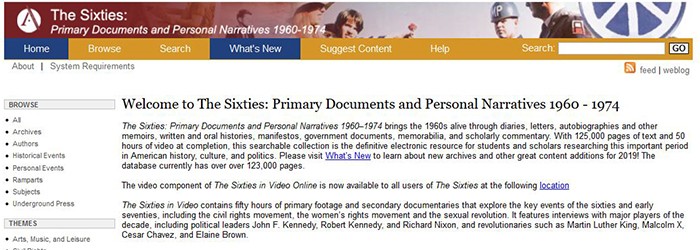
The Sixties: Primary Documents and Personal Narratives 1960-1974
The Sixties: Primary Documents and Personal Narratives 1960-1974 (Alexander Street) collects primary sources documenting a critical period in United States history and culture, including 125,000 pages of “diaries, letters, autobiographies and other memoirs, written and oral histories, manifestos, government documents, memorabilia, and scholarly commentary,” along with videos and images. Core themes include: Arts, Music, and Leisure, Civil Rights, Counter-Culture, Law and Government, Left and Radical Left Movements, Mass and Underground Media, Right and Radical Right Movements, Science and Technology, Sexual Revolution, Student Activism, Vietnam War, and the Women's Movement. The “Sexual Revolution” subject includes an extensive collection of documents from the Sexual Freedom League, including their newsletter and publications Eros Lib and Sexual Freedom; sex-themed coverage in Ramparts, The Berkeley Barb, Fifth Estate, The Rag, and other alternative newspapers and magazines; and other miscellaneous articles and ephemera.

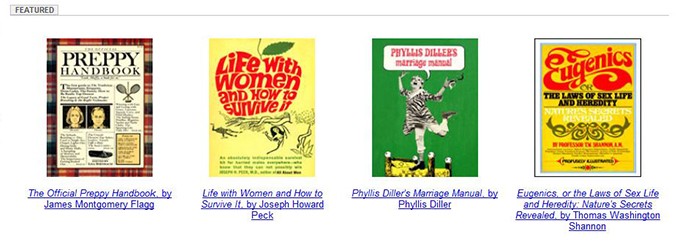
Twentieth Century Advice Literature: North American Guides on Race, Sex, Gender, and the Family
Twentieth Century Advice Literature: North American Guides on Race, Gender, Sex, and the Family (Alexander Street) features over 150,000 pages of “the instructional, prescriptive, behavioral, and etiquette literature that defined standards of personal conduct for millions of Americans and reflected the prevailing social mores across the twentieth century.” These books, pamphlets, and manuals cover recommended standards of behavior in terms of religion, business, citizenship, health, hygiene, education, family, relationships, travel, and a litany of other forms of etiquette in the United States. Under the category of “Guides to Sex, Love, and Marriage,” over 175 digitized texts published between 1877 and 2007 appear, searchable through dozens of subject keywords and as well as according to their intended audience. Sources address dating, marriage, birth control, sex education, gender roles, homosexuality, and many other topics from a wide range of medical, religious, psychological, and political perspectives.

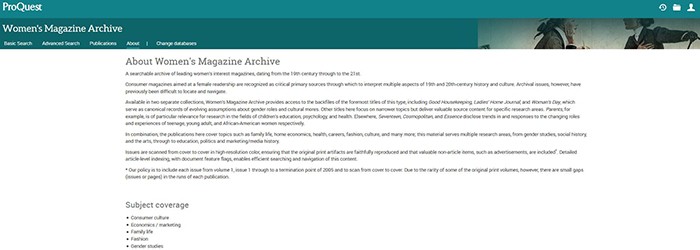
The Women’s Magazine Archive
The ProQuest Women’s Magazine Archive offers near complete digital collections of twelve prominent women’s magazines from the late nineteenth through early twenty-first century United States. Full text searchable files, including advertisements, are available for Better Homes & Gardens (1922-2005); Chatelaine (1928-2005), Cosmopolitan (1886-2005), Essence (1970-2005), Good Housekeeping (1885-2005), Ladies Home Journal (1885-2005), Parents (1926-2005), Redbook (1903-2005), Seventeen (1944-2005), Town & Country (1975-2003), WIN News (1975-2003) and Woman's Day (1937-2005). Also see the Vogue Archive Database, which offers full color digital scans of Vogue Magazine from 1892 through the present, with full page-by-page content from each issue including advertisements.

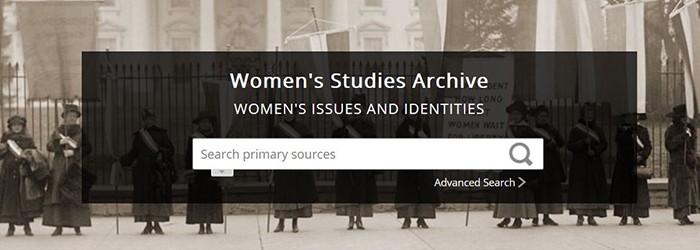
Women’s Studies Archive Database
Women’s Studies Archive: Women’s Issues and Identities (Gale) collects approximately one million pages of digitized primary source materials focusing on women’s lives, organizations, and social and political experiences in the nineteenth and twentieth century United States and Europe. The fifteen core collections include records from important women’s groups (Women’s International League for Peace and Freedom, Women’s Trade Union League, Women’s Peace Party, and others); thematic collections on the law, health and mental health, and everyday life; and periodicals addressing birth control, feminism, and women’s liberation movements. Of particular interest are the 1900-1901 records of the Committee of Fifteen, a New York City anti-prostitution reform group; the Planned Parenthood Federation of America records; early birth control periodicals such as The Malthusian and The Eugenics Review; a wide range of feminist and lesbian journals and newspapers, including The Ladder, Off Our Backs, and Lavender Vision; and records from grassroots feminist groups such as the Abortion Action Coalition, the Boston Women’s Union, and the San Francisco Women’s Building/Women’s Center.